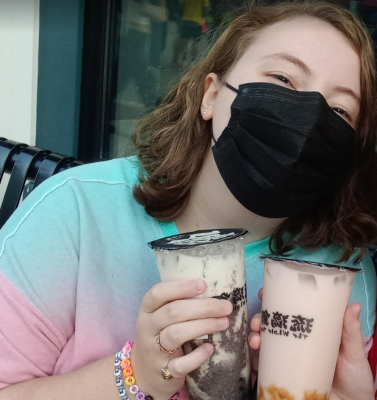
Hi there everyone! My name is Avi Obie (they/them/theirs), and I’m a junior at UConn pursuing a BFA in Digital Media & Design with a concentration in Film/Video Production, and a minor in American Sign Language & Deaf Studies. As well as working at the UConn Rainbow Center as a Student Staff member and a FAMILEE Mentor, I am now an Eco-Digital Storyteller (EDS) Mentor! One of my passions is working in community building and helping others, both things that I plan to do within my position as an EDS Mentor.

My main forms of work are videography, audiography, and photography (feel free to check out my portfolio!). Although I don’t do much environmental work, I’ve done a lot of environmental photography, and enjoy spending my own time in nature – my favorite place in nature is a small bench by a lake that I live near (picture by me to the right), or getting to walk up to Heublein Tower in Talcott Mountain State Park.
Outside of class or work, you can find me listening or creating music (I play a few instruments), or playing a video or tabletop game. I’m involved with the Tabletop Gaming Club at UConn campus, and the Queer Collective. I enjoy trying new things with my friends, whether it’s food or experiences.
My mission revolves around the form of activism that involves community care and support. As I mentioned, my passion is working in communities, and with this position I’ll be helping West Haven High School with an environmental project that they’re passionate about and that will improve their local area. I’m excited to be working with these students, and can’t wait to see every school’s final project!
NRCA’s Eco-Digital Storytellers is funded by a grant from the National Science Foundation Innovative Technology Experiences for Students and Teachers program. The material on this webpage is based upon work supported by the National Science Foundation under Grant No. 2148606. Any opinions, findings, and conclusions or recommendations expressed in this material are those of the author(s) and do not necessarily reflect the views of the National Science Foundation.